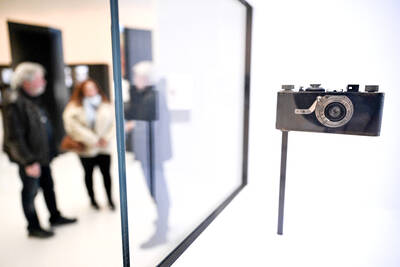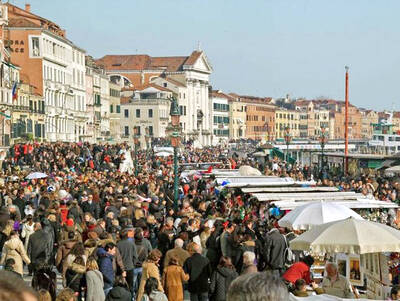The Experimental Theater was packed on Saturday night for French choreographer Thierry Bae's Journal d'Inquietude (Diary of Worries), mostly it seemed, to see the not-so-short film that was the centerpiece of the play. And Journal d'Inquietude was definitely more of a play that a dance performance.
Act One was a solo by Bae that has half dance, half monologue, as he described his movements, directed his movements, berated himself and bemoaned the fate of an independent choreographer just trying to survive. Or at least that was what I got out of it, since Bae was speaking French and while Chinese subtitles were projected at the top of screen on the back wall behind him, my reading comprehension is not very good.
Act Two was the video (shot by Francois Lejault), which opens with Bae lying on a floor, talking on his cellphone. His conversations are the main thrust of the video, which supposedly follows him over a 20-day period as he tries to find both a place to put on his dance and someone to perform it.
In the beginning there is a little local flavor added as Bae meets a French friend at a night market food stall for some Taiwan Beer, followed in quick succession by his visits to Chinese medicine doctors for a cupping treatment (with a quick pan of the camera down his much-bruised back at the end of the session) and moxibustion treatment to treat his chronic lung illness. But much of the film is spent in featureless corridors or rooms that could be in any city, any country.
Among those making cameo appearances were dancer Sheu Fang-yi (許芳宜), dancer/choreographers Chou Shu-yi (周書毅) and Lin Wen-chung (林文中) and choreographer Yau Shi-fen (姚淑芬). Bae gets so desperate he even tries to convince film director Hou Hsiao-hsien (侯孝賢) to join him. The sly in-jokes about Taiwan's dance world and the life of an artist were much appreciated by the audience. The film ends with Bae getting ready for the performance - apparently on his own - after reassuring the promoter that he does have a local star.
When the lights came back up on Saturday night for Act Three, Bae was directing Lin, late of the Bill T. Jones/Arnie Zane Dance Company, in a solo.
In the film, the two men never met, as Bae runs all over Taipei trying to find the coffee shop where Lin is waiting. The deadpan expression on Lin's face as he waits for hours before giving up (the passage of time shown by the parade of couples at the table next to Lin's) was priceless - and a wonderful counterpoint to the fluidity of his body in the solo later on.
Many in the audience (including some members of the Cloud Gate family) knew that Chou had been the uncredited "special guest" on Friday night and there was speculation as to who would dance the Sunday matinee. Several were sure it would Sheu since Yau doesn't even dance in her own troupe's (Century Contemporary Dance Company, 世紀當代舞團) shows - but the theater staff were keeping mum.

Photographer Franziska Stuenkel likes to take spontaneous urban shots, so she needs a nimble camera that is ready to go when inspiration strikes: her German-made Leica M11. “I have to be very quick and discreet,” said the Berlin-based artist who captures reflections of people walking past windows, their contours merging with the shapes behind the glass. Stuenkel’s compact Leica is the perfect camera for the job, the 51-year-old told AFP. Famous for its pocket-sized and retro-style devices, the Leica brand is celebrating a milestone as it marks 100 years since its first commercial camera was presented to the public. The

As global travel rebounds following the COVID-19 pa ndemic, the longstanding issue of overtourism has returned stronger than ever. Throughout 2024, numerous popular destinations worldwide struggled with tourist numbers that far exceeded their infrastructural and environmental capacities. Not only does this surge congest streets and pollute landscapes, but it also endangers cultural sites and disrupts the daily lives of residents. In response to the growing problem of “overtourism,” various nations have adopted diverse strategies, some of which have sparked controversy. Venice, Italy, has not hesitated to take bold action; since 2024, the city has implemented one of the

Dogs’ noses are incredibly keen. They can even detect changes in cortisol levels in human sweat and breath. Known as the “stress hormone,” cortisol increases when humans are under pressure. Recent research indicates that the smell of human stress can influence a dog’s behavior and emotions. In the study, human volunteers were exposed to the stressful tasks of preparing and delivering a speech on the spot and then solving math problems. __1__ Researchers collected sweat and breath samples from the volunteers on pieces of cloth during both their stressful and restful states. Meanwhile, other researchers worked with 18

1. 錢已經用一半了。 ˇ Half of the money is gone. χ Half of the money are gone. 註:Half of ... 作主詞時,動詞與介詞 of 後面的名詞或代名詞相一致,即名詞或代名詞是單數時,動詞該是單數;若為複數,則動詞也該是複數,例如: Half of the story is interesting. Half of the stories are interesting. Half of it is interesting. Half of them are interesting. 2. 許多人走過這條路。 ˇ Many a man has travelled this road. χ Many a man have travelled this road. 註:many a 意義上雖然作 many 解,但後面應跟單數名詞,動詞也用單數形式。 3. 敵人被迫投降。 ˇ The enemy were forced to surrender. χ The enemy was forced to surrender. 註:enemy 作為總稱,前面須有定冠詞,用作句子主詞時,動詞通常用複數形。類似的情形如 talent: Taiwan is known for its semiconductor technology and is actively working to attract and retain global talent. 4. 他倆誰都不該責怪。 ˇ Neither of them is to blame. χ